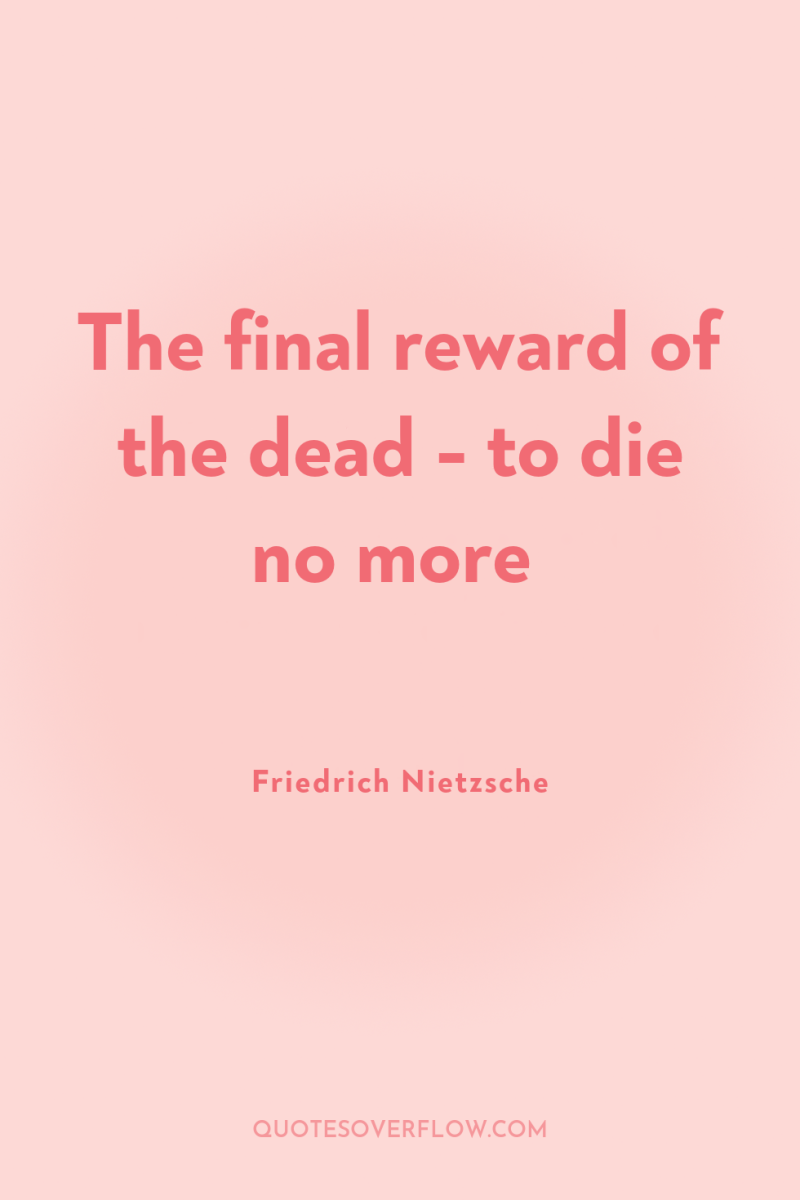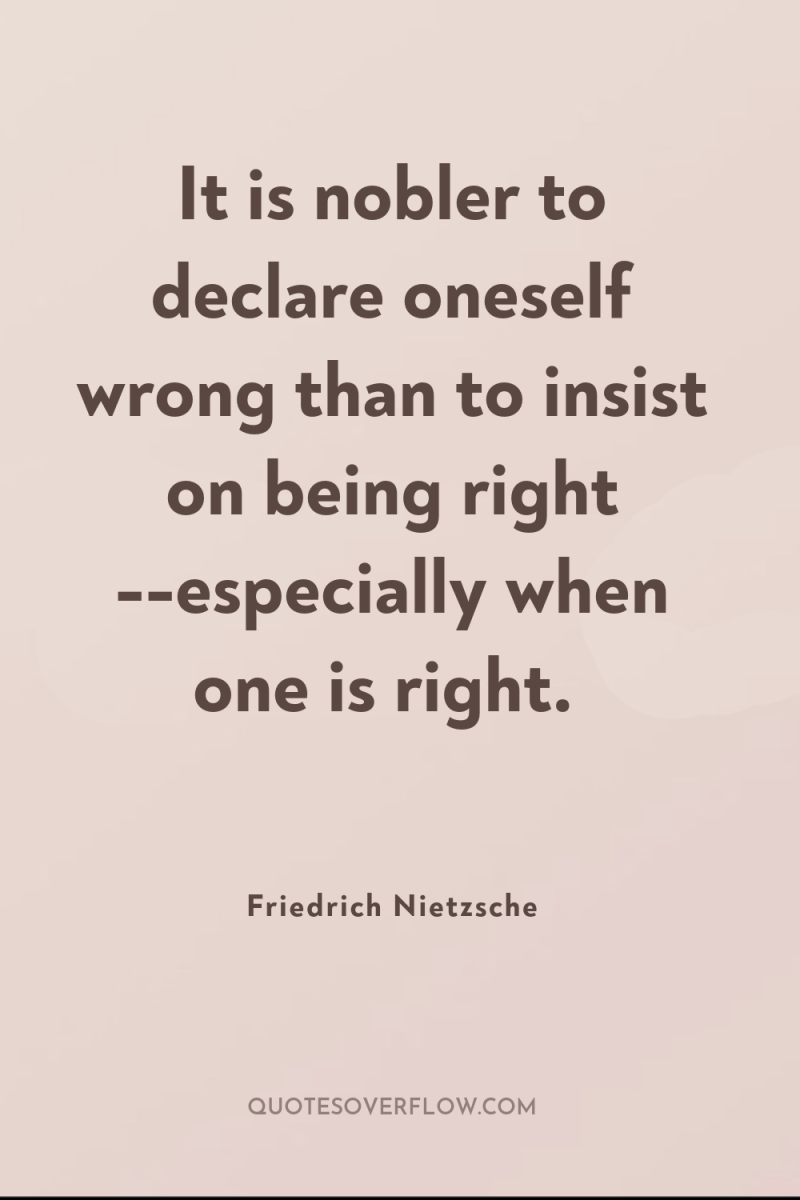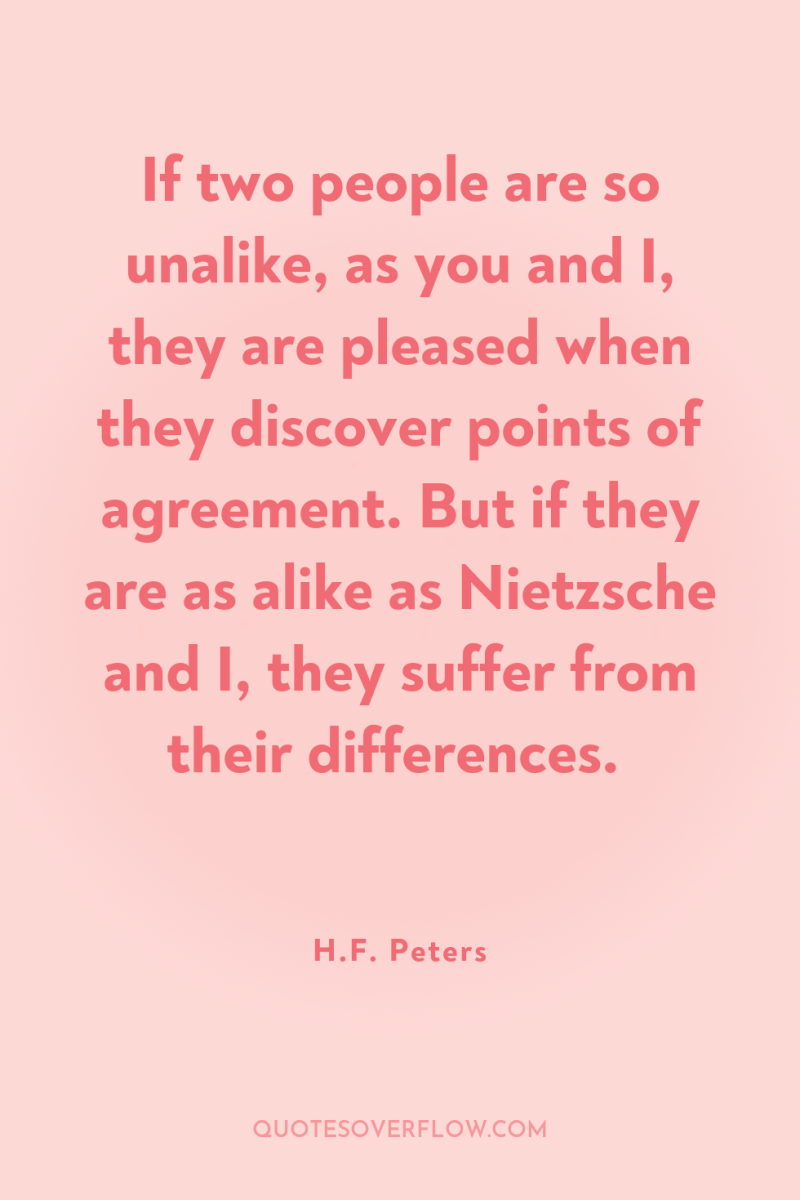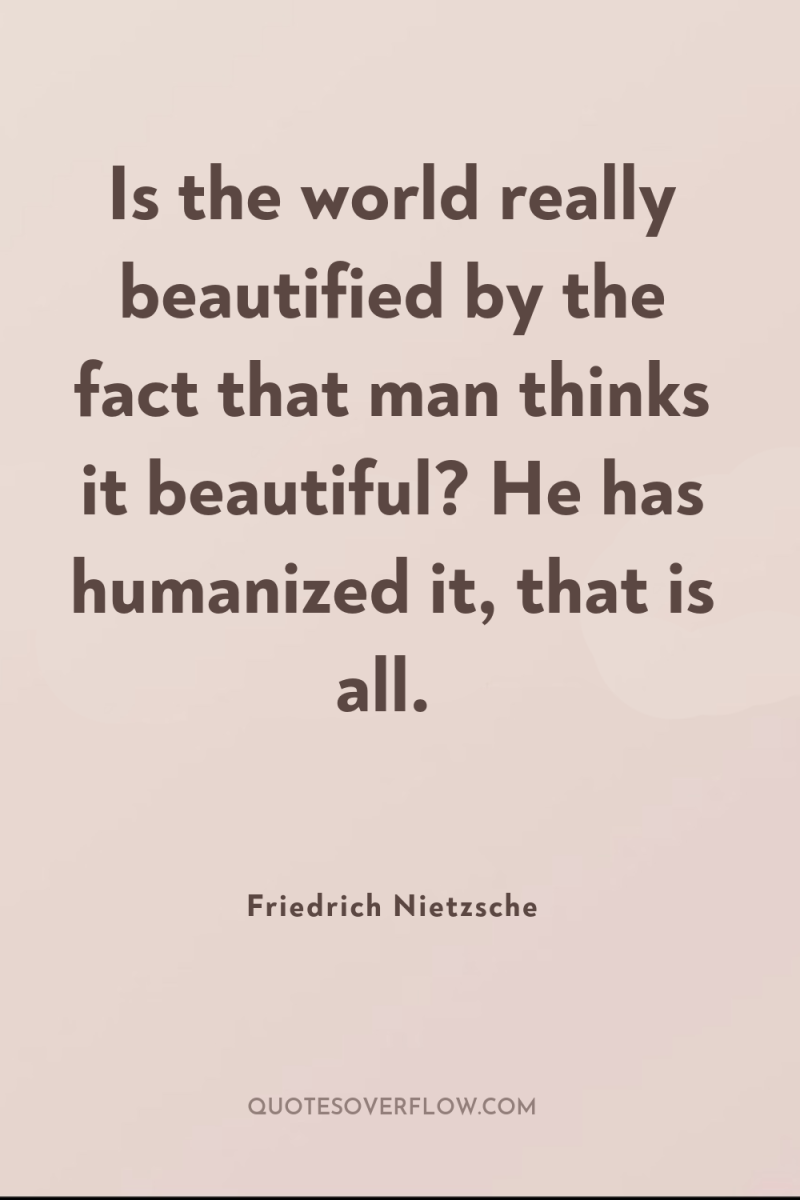
1
You would not enjoy Nietzsche, sir. He is fundamentally unsound.P.g. Wodehouse

2
A soul that knows it is loved but does not itself love betrays its sediment: what is at bottom comes up."― Epigrams and Interludes, Section 79Friedrich Nietzsche

3
Almighty God, I am sorry I am now an atheist, but have You read Nietzsche?John Fante

4
The final reward of the dead - to die no moreFriedrich Nietzsche
5
This kind of renunciation, in fact, has often been the strength, born of necessity, of the world's disinherited, of those who do not fit in with their surroundings or with their own body or with their own race or tradition and who hope, by means of renunciation, to assure for themselves a future world where, to use a Nietzschean expression, the inversion of all values will occur.Julius Evola

6
It is nobler to declare oneself wrong than to insist on being right --especially when one is right.Friedrich Nietzsche

7
If two people are so unalike, as you and I, they are pleased when they discover points of agreement. But if they are as alike as Nietzsche and I, they suffer from their differences.H.F. Peters
8
If you stare at someone long enough, they'll eventually look back at you.Cory Doctorow
9
It is the fate of great achievements, born from a way of life that sets truth before security, to be gobbled up by you and excreted in the form of shit. For centuries great, brave, lonely men have been telling you what to do. Time and again you have corrupted, diminished and demolished their teachings; time and again you have been captivated by their weakest points, taken not the great truth, but some trifling error as your guiding principal. This, little man, is what you have done with Christianity, with the doctrine of sovereign people, with socialism, with everything you touch. Why, you ask, do you do this? I don't believe you really want an answer. When you hear the truth you'll cry bloody murder, or commit it. … You had your choice between soaring to superhuman heights with Nietzsche and sinking into subhuman depths with Hitler. You shouted Heil! Heil! and chose the subhuman. You had the choice between Lenin's truly democratic constitution and Stalin's dictatorship. You chose Stalin's dictatorship. You had your choice between Freud's elucidation of the sexual core of your psychic disorders and his theory of cultural adaptation. You dropped the theory of sexuality and chose his theory of cultural adaptation, which left you hanging in mid-air. You had your choice between Jesus and his majestic simplicity and Paul with his celibacy for priests and life-long compulsory marriage for yourself. You chose the celibacy and compulsory marriage and forgot the simplicity of Jesus' mother, who bore her child for love and love alone. You had your choice between Marx's insight into the productivity of your living labor power, which alone creates the value of commodities and the idea of the state. You forgot the living energy of your labor and chose the idea of the state. In the French Revolution, you had your choice between the cruel Robespierre and the great Danton. You chose cruelty and sent greatness and goodness to the guillotine. In Germany you had your choice between Goring and Himmler on the one hand and Liebknecht, Landau, and Muhsam on the other. You made Himmler your police chief and murdered your great friends. You had your choice between Julius Streicher and Walter Rathenau. You murdered Rathenau. You had your choice between Lodge and Wilson. You murdered Wilson. You had your choice between the cruel Inquisition and Galileo's truth. You tortured and humiliated the great Galileo, from whose inventions you are still benefiting, and now, in the twentieth century, you have brought the methods of the Inquisition to a new flowering. … Every one of your acts of smallness and meanness throws light on the boundless wretchedness of the human animal. 'Why so tragic?' you ask. 'Do you feel responsible for all evil?' With remarks like that you condemn yourself. If, little man among millions, you were to shoulder the barest fraction of your responsibility, the world would be a very different place. Your great friends wouldn't perish, struck down by your smallness. .Wilhelm Reich
10
A connection could be drawn between the secular ascent of biblical values in today's world and the depreciation of beauty that characterizes it on so many levels. Beauty today is often depreciated as monotonous or denounced as a constraining norm, when it is simply reduced to a pure spectacle accompanied by a rehabilitation or even exaltation of deformity and ugliness, as can be seen in many areas. The degeneration of beauty and the promotion of ugliness, tied to the flowering of intellectualism, could be certainly be part of the Umwertung stigmatized by Nietzsche.Alain De Benoist

11
Is the world really beautified by the fact that man thinks it beautiful? He has humanized it, that is all.Friedrich Nietzsche
12
Just as little as a reader today reads all of the individual words (let alone syllables) on a page–rather he picks about five words at random out of twenty and "guesses" at the meaning that probably belongs to these five words–just as little do we see a tree exactly and completely with reference to leaves, twigs, color, and form; it is so very much easier for us to simply improvise some approximation of a tree. Even in the midst of the strangest experiences we will still do the same: we make up the major part of the experience and can scarcely be forced not to contemplate some event as its "inventors." All this means: basically and from time immemorial we are–accustomed to lying. Or to put it more virtuously and hypocritically, in short, more pleasantly: one is much more of an artist than one knows.Friedrich Nietzsche
14
You desire to LIVE "according to Nature"? Oh, you noble Stoics, what fraud of words! Imagine to yourselves a being like Nature, boundlessly extravagant, boundlessly indifferent, without purpose or consideration, without pity or justice, at once fruitful and barren and uncertain: imagine to yourselves INDIFFERENCE as a power–how COULD you live in accordance with such indifference? To live–is not that just endeavouring to be otherwise than this Nature? Is not living valuing, preferring, being unjust, being limited, endeavouring to be different? And granted that your imperative, "living according to Nature, " means actually the same as "living according to life"–how could you do DIFFERENTLY? Why should you make a principle out of what you yourselves are, and must be? In reality, however, it is quite otherwise with you: while you pretend to read with rapture the canon of your law in Nature, you want something quite the contrary, you extraordinary stage-players and self-deluders! In your pride you wish to dictate your morals and ideals to Nature, to Nature herself, and to incorporate them therein; you insist that it shall be Nature "according to the Stoa, " and would like everything to be made after your own image, as a vast, eternal glorification and generalism of Stoicism! With all your love for truth, you have forced yourselves so long, so persistently, and with such hypnotic rigidity to see Nature FALSELY, that is to say, Stoically, that you are no longer able to see it otherwise–and to crown all, some unfathomable superciliousness gives you the Bedlamite hope that BECAUSE you are able to tyrannize over yourselves– Stoicism is self-tyranny– Nature will also allow herself to be tyrannized over: is not the Stoic a PART of Nature?.. But this is an old and everlasting story: what happened in old times with the Stoics still happens today, as soon as ever a philosophy begins to believe in itself. It always creates the world in its own image; it cannot do otherwise; philosophy is this tyrannical impulse itself, the most spiritual Will to Power, the will to "creation of the world, " the will to the causa prima.Friedrich Nietzsche
15
It’s about Nietzsche’s theory of universal debt. Your parents make it possible for you to believe a far better myth than Santa. They let you think that you, as a kid, don’t owe the world a thing. The world can give you, even if just for a few minutes, utter joy without requiring anything from you. It’s not about consumerism. As far as you know, no one buys you these presents. They come out of nothingness, with fantasies of elves attached. You aren’t required to be grateful to your parents or anything like that. They can give to you and nothing is required in return. When you get old enough, when you have kids, you get to enact this myth for them. It has nothing to do with any fat man in a red suit, no matter what we tell ourselves. It’s about owing nothing, and then realizing that you have to do this job of perpetuating this… this fantasy world, whether you like it or not.Thomm Quackenbush
16
Whoever fights monsters should see to it that in the process he does not become a monster.Sophie Jordan
17
Well, there is a piece of famous advice, grand advice even if it is German, to forget what you can't bear. The strong can forget, can shut out history. Very good. Even if it is self-flattery to speak of strength--these aesthetic philosophers, they take a posture, but power sweeps postures away. Still, it's true you can't go on transposing one nightmare into another, Nietzsche was certainly right about that. The tender-minded must harden themselves. Is this world nothing but a barren lump of coke? No, no, but what sometimes seems a system of prevention, a denial of what every human being knows. I love my children, but I am the world to them, and bring them nightmares. I had this child by my enemy. And I love her. The sight of her, the odor of her hair, this minute, makes me tremble with love. Isn't it mysterious how I love the child of my enemy? But a man doesn't need happiness for himself. No, he can put up with any amount of torment--with recollections, with his own familiar evils, despair. And this is the unwritten history of man, his unseen, negative accomplishment, his power to do without gratification for himself provided there is something great, something into which his being, and all beings can go. He does not need meaning as long as such intensity has scope. Because then it is self-evident; it is meaning. .Saul Bellow
18
Nietzsche was the one who did the job for me. At a certain moment in his life, the idea came to him of what he called 'the love of your fate.' Whatever your fate is, whatever the hell happens, you say, 'This is what I need.' It may look like a wreck, but go at it as though it were an opportunity, a challenge. If you bring love to that moment--not discouragement--you will find the strength is there. Any disaster you can survive is an improvement in your character, your stature, and your life. What a privilege! This is when the spontaneity of your own nature will have a chance to flow. Then, when looking back at your life, you will see that the moments which seemed to be great failures followed by wreckage were the incidents that shaped the life you have now. You’ll see that this is really true. Nothing can happen to you that is not positive. Even though it looks and feels at the moment like a negative crisis, it is not. The crisis throws you back, and when you are required to exhibit strength, it comes. .Joseph Campbell
19
For one thing is needful: that a human being should attain satisfaction with himself, whether it be by means of this or that poetry or art; only then is a human being at all tolerable to behold. Whoever is dissatisfied with himself is constantly ready for revenge, and we others will be his victims, if only by having to endure his ugly sight.Friedrich Nietzsche
20
At the bar on the Favoritenstrasse, Julius the policeman talked to us about dignity, evolution, the great Darwin and the great Nietzsche. I translated so that my good friend Ulises could understand what he was saying, although I didn’t understand any of it. The prayer of the bones, said Julius. The yearning for health. The virtue of danger. The tenacity of the forgotten. Bravo, said my good friend Ulises. Bravo, said everyone else. The limits of memory. The wisdom of plants. The eye of parasites. The agility of the earth. The merit of the soldier. The cunning of the giant. The hole of the will. Magnificent, said my good friend Ulises in German. Extraordinary.Unknown
21
Wonders amaze me. They can aim wanderlessly in any forest, be it of dark trees or lighted bushes. And apparently, as per what I’ve heard, they can buy stuff that’s on sale, but only if and when they feel wonderfully wonderful. Because otherwise they wouldn’t really be themselves, which would be a problem for them, because if they aren’t what they are - they can’t exist, and if they don’t exist — that makes them invisible and silent to all the wandering people, who may or may not be looking for them to sell themselves to. .Will Advise
22
[Nietzsche's] questions - transcend, but where to; ascend, but to what height? - would have answered themselves if he had calmly kept both feet on the ascetic ground. He was too sick to follow his most important insight: that the main thing in life is to take the minor things seriously. When minor things grow stronger, the danger posed by the main thing is contained; then climbing higher in the minor things means advancing in the main thing.Peter Sloterdijk
23
Blessed are the forgetful, for they get the better even of their blunders.Friedrich Nietzsche
24
You see, the bodily resurrection of Jesus isn't a take-it-or-leave-it thing, as though some Christians are welcome to believe it and others are welcome not to believe it. Take it away, and the whole picture is totally different. Take it away, and Karl Marx was probably right to accuse Christianity of ignoring the problems of the material world. Take it away, and Sigmund Freud was probably right to say that Christianity is a wish-fulfillment religion. Take it away, and Friedrich Nietzsche was probably right to say that Christianity was a religion for wimps. Put it back, and you have a faith that can take on the postmodern world that looks to Marx, Freud and Nietzsche as its prophets, and you can beat them at their own game with the Easter news that the foolishness of God is wiser than men, and the weakness of God is stronger than men.N.T. Wright
25
The darker side of Nietzsche’s ideas was incorporated into the Nazi belief system. Part of the link was straightforward: some things Nietzsche said were pure Nazi doctrine. His comments that ‘The extinction of many types of people is just as desirable as any form of reproduction’ and that ‘the tendency must be towards the rendering extinct of the wretched, the deformed, the degenerate’ could come from any work on racial hygiene. Nietzsche’s central contribution was not these explicitly Social Darwinist views, but his rejection of the Judeo-Christian morality of compassion for the weak. Self-creation required hardness towards oneself: a strong will imposing coherence on conflicting impulses. It also requires hardness on others. Conflicts between the self-creative projects of different people made inevitable the attempt to dominate others. The whole of life was a struggle in which victory went to the brave and to the strong-willed. Noble human qualities, linked with the will to power, were brought out in combat but atrophied in peace. Compassion was weakness, cowardice and self-deception. The Judeo-Christian emphasis on it was poison. In drawing these consequences from his beliefs about the death of God and from Social Darwinism, Nietzsche provided the part of the Nazi belief system which ‘justified’ the cruel steps they took to implement their other beliefs.Jonathan Glover
26
One not only wants to be understood when one writes, but also quite as certainly not to be understood. It is by no means an objection to a book when someone finds it unintelligible: perhaps this might just have been the intention of its author, perhaps he did not want to be understood by "anyone”. A distinguished intellect and taste, when it wants to communicate its thoughts, always selects its hearers; by selecting them, it at the same time closes its barriers against "the others". It is there that all the more refined laws of style have their origin: they at the same time keep off, they create distance, they prevent "access" (intelligibility, as we have said, ) while they open the ears of those who are acoustically related to them. .Friedrich Nietzsche
27
It is intoxicating joy for the sufferer to look away from his suffering and to forget himself.Friedrich Nietzsche
28
They were handsome, proper and normal family fathers who built the concentration camps and whipped the prisoners to death. And who was Nietzsche? A narcotized syphilitic.Unknown
29
The consequences of our actions take hold of us, quite indifferent to our claim that meanwhile we have 'improved.Friedrich Nietzsche
30
What doesn't kill us makes a good story.Marty Rubin
31
Language has been mobilised and sent into battle; it directs the human carnage of conflict with its enunciation of emotion, stimulating souls to abandon peace.Daniel S. Fletcher
32
As the savage progresses, he acquires experience and formulates codes of 'right' and 'wrong' from his memories of those courses which have helped or hurt him... Then out of the principle of barter comes the illusion of 'justice' ...Lovecraft H.P.
33
Even though there is neither much altruism nor equality in the world, there is almost universal endorsement of the values of altruism and equality - even, notoriously (and as Nietzsche seemed well aware), by those who are is worst enemies in practice. So Nietzsche's critique is that a culture in the grips of MPS [Morality in the Pejorative Sense], even without acting on MPS, poses the real obstacle to flourishing, because it teaches potential higher types to disvalue what would be most conductive to their creativity and value what is irrelevant or perhaps even hostile to it.Brian Leiter
34
All history is the experimental refutation of the theory of the so-called moral order of things.Friedrich Nietzsche
35
Every means hitherto employed with the intention of making mankind moral has been thoroughly immoral.Friedrich Nietzsche
36
This workshop where ideals are manufactured--it seems to me it stinks of so many liesFriedrich Nietzsche
37
Your only problem, perhaps, is that you scream without letting yourself cry.Friedrich Nietzsche
38
The priest invents and encourages every kind of suffering and distress so that man may not have the opportunity to become scientific, which requires a considerable degree of free time, health, and an outlook of confident positivism. Thus, the religious authorities work hard to make and keep people feeling sinful, unworthy, and unhappy.Robert Sheaffer
39
Everyone who has ever built anywhere a new heaven first found the power thereto in his own hell.Friedrich Nietzsche
40
As thoroughly as mankind has killed God, the reader has despatched the author.Johnny Rich
41
But I need solitude--which is to say, recovery, return to myself, the breath of a free, light, playful air.Friedrich Nietzsche
42
Nietzsche says very clearly all the way through his career that if you want to define human nature the first thing you must say is that human beings insist on value--we see the world through value colored eyes. We do not know how to look at things neutrally, value-free. So, it's not a question of giving up all values, it's simply a question of which values.Robert C. Solomon
43
For a brief moment I felt I was the older, the more mature." A gift of life, " I responded, "if not to say, a gift of God, such as music, should not have the mocking charge of paradox leveled at it for things that are merely evidence of the fullness of its nature. One should love them."" Do you believe love is the strongest emotion?" he asked." Do you know any stronger?"" Yes, interest."" By which you probably mean a love that has been deprived of its animal warmth, is that it?"" Let's agree on that definition! " he said with a laugh. "Good night! " We had arrived again at the Leverkühn house, and he opened his front door.Thomas Mann
44
Darwin and Nietzsche were the common spiritual and intellectual source for the mean-spirited and bellicose ideological assault on progress, liberalism, and democracy that fired the late-nineteenth-century campaign to preserve or rejuvenate the traditional order. Presensitized for this retreat from modernity, prominent fin-de-siècle aesthetes, engages literati, polemical publicists, academic sociologists, and last but not least, conservative and reactionary politicians became both consumers and disseminators of the untried action-ideas. Oscar Wilde and Stefan George were perhaps most representative of the aristocratizing aesthetes whose rush into dandyism or retreat into cultural monasticism was part of the outburst against bourgeois philistinism and social levelling. Their yearning for a return to an aristocratic past and their aversion to the invasive democracy of their day were shared by Thomas Mann and Hugo von Hofmannsthal, whose nostalgia for the presumably superior sensibilities of a bygone cultivated society was part of their claim to privileged social space and position in the present. Although they were all of burgher or bourgeois descent, they extolled ultra-patrician values and poses, thereby reflecting and advancing the rediscovery and reaffirmation of the merits and necessities of elitism. Theirs was not simply an aesthetic and unpolitical posture precisely because they knowingly contributed to the exaltation of societal hierarchy at a time when this exaltation was being used to do battle against both liberty and equality. At any rate, they may be said to have condoned this partisan attack by not explicitly distancing themselves from it. Maurice Barrès, Paul Bourget, and Gabriele D'Annunzio were not nearly so self-effacing. They were not only conspicuous and active militants of antidemocratic elitism, but they meant their literary works to convert the reader to their strident persuasion. Their polemical statements and their novels promoted the cult of the superior self and nation, in which the Church performed the holy sacraments. Barrès, Bourget, and D'Annunzio were purposeful practitioners of the irruptive politics of nostalgia that called for the restoration of enlightened absolutism, hierarchical society. and elite culture in the energizing fires of war.Arno J. Mayer
45
Remember, our kind protects you Normals from the Pures. We are the rope tied between man and super-beast. A rope forever dangling from the precipice. I tap Zetania's shoulder and ask, "What's a precipice?" "A cliff's edge, " she whispers. Precipice. Must be a French word.Daven Anderson
46
Nietzsche, an infinitely harder and more courageous intellect, was incapable of any such confusion of ideas; he seldom allowed sentimentality to turn him from the glaring fact.H.l. Mencken
47
One must shed the bad taste of wanting to agree with many. "Good" is no longer good when one's neighbor mouths it. And how should there be a "common good"! The term contradicts itself: whatever can be common always has little value. In the end it must be as it is and always has been: great things remain for the great, abysses for the profound, nuances and shudders for the refined, and, in brief, all that is rare for the rare. .Friedrich Nietzsche
48
I obviously do everything to be "hard to understand" myselfFriedrich Nietzsche
49
A man who wills commands something within himself that renders obedience, or that he believes renders obedience.Friedrich Nietzsche
50
What is familiar is what we are used to; and what we are used to is most difficult to 'Know' - that is, to see as a problem; that is, to see as strange, as distant, as 'outside us'.Friedrich Nietzsche
51
Our faith in others betrays that we would rather have faith in ourselves. Our longing for a friend is our betrayer. And often with our love we want merely to overcome envy. And often we attack and make ourselves enemies, to conceal that we are vulnerable.Friedrich Nietzsche
52
Fukuyama’s thesis that history has climaxed with liberal capitalism may have been widely derided, but it is accepted, even assumed, at the level of the cultural unconscious. It should be remembered, though, that even when Fukuyama advanced it, the idea that history had reached a ‘terminal beach’ was not merely triumphalist. Fukuyama warned that his radiant city would be haunted, but he thought its specters would be Nietzschean rather than Marxian. Some of Nietzsche’s most prescient pages are those in which he describes the ‘oversaturation of an age with history’. ‘It leads an age into a dangerous mood of irony in regard to itself’, he wrote in Untimely Meditations, ‘and subsequently into the even more dangerous mood of cynicism’, in which ‘cosmopolitan fingering’, a detached spectatorialism, replaces engagement and involvement. This is the condition of Nietzsche’s Last Man, who has seen everything, but is decadently enfeebled precisely by this excess of (self) awareness.Mark Fisher
53
Men speak of God’s love for man… but if providence does not come in this hour, where is He then? My conclusion is simple. The Semitic texts from Bronze Age Palestine of which Christianity is comprised still fit uncomfortably well with contemporary life. The Old Testament depicts a God capricious and cruel; blood sacrifice, vengeance, genocide; death and destruction et al. Would He not approve of Herr Hitler and the brutal, tribalistic crusade against Hebrews and non- Christian ‘untermensch?’One thing is inarguable. His church on Earth has produced some of the most vigorous and violent contribution to the European fascist cause. It is synergy. Man Created God, even if God Created Man; it all exists in the hubris and apotheosis of the narcissistic soul, and alas, all too many of the human herd are willing to follow the beastly trait of leadership. The idea of self-emancipation and advancement, with Europe under the jackboot of fascism, would be Quixotic to the point of mirthless lunacy.Daniel S. Fletcher
54
Equality before the enemy -that is the main condition to fight a fair duel. Where you have contempt, you cannot wage war; where you are in command, where you can see someone beneath you, you should not wage war.Friedrich Nietzsche
55
Friedrich Nietzsche, who famously gave us the ‘God is dead’ phrase was interested in the sources of morality. He warned that the emergence of something (whether an organ, a legal institution, or a religious ritual) is never to be confused with its acquired purpose: ‘Anything in existence, having somehow come about, is continually interpreted anew, requisitioned anew, transformed and redirected to a new purpose.’ This is a liberating thought, which teaches us to never hold the history of something against its possible applications. Even if computers started out as calculators, that doesn’t prevent us from playing games on them. (47) (quoting Nietzsche, the Genealogy of Morals).Frans De Waal
56
I ascended, I ascended, I dreamt, I thought, –but everything oppressed me. A sick one did I resemble, whom bad torture wearieth, and a worse dream reawakeneth out of his first sleep.– But there is something in me which I call courage: it hath hitherto slain for me every dejection. This courage at last bade me stand still and say: "Dwarf! Thou! Or I! "–For courage is the best slayer, –courage which attacketh: for in every attack there is sound of triumph. Man, however, is the most courageous animal: thereby hath he overcome every animal. With sound of triumph hath he overcome every pain; human pain, however, is the sorest pain. Courage slayeth also giddiness at abysses: and where doth man not stand at abysses! Is not seeing itself–seeing abysses? Courage is the best slayer: courage slayeth also fellow-suffering. Fellow-suffering, however, is the deepest abyss: as deeply as man looketh into life, so deeply also doth he look into suffering. Courage, however, is the best slayer, courage which attacketh: it slayeth even death itself; for it saith: "Was that life? Well! Once more! .Friedrich Nietzsche
57
You make me laugh, with your metaphysical anguish, its just that you're scared silly, frightened of life, of men of action, of action itself, of lack of order. But everything is disorder, dear boy. Vegetable, mineral and animal, alldisorder, and so is the multitude of human races, the life of man, thought, history, wars, inventions, business and the arts, and all theories, passionsand systems. Its always been that way. Why are you trying to make something outof it? And what will you make? what are you looking for? There is no Truth.There's only action, action obeying a million different impulses, ephemeralaction, action subjected to every possible and imaginable contingency andcontradiction, Life. Life is crime, theft, jealousy, hunger, lies, disgust, stupidity, sickness, volcanic eruptions, earthquakes, piles of corpses. what can you do about it, my poor friend?.Blaise Cendrars
58
What are you looking for? There is no Truth. There's only action, action obeying a million different impulses, ephemeral action, action subjected to every possible and imaginable contingency and contradiction, Life. Life is crime, theft, jealousy, hunger, lies, disgust, stupidity, sickness, volcanic eruptions, earthquakes, piles of corpses. what can you do about it, my poor friend?Blaise Cendrars
59
We have to be careful that in throwing out the devil, we don't throw out the best part of ourselves.Friedrich Nietzsche
60
I am convinced that when Nietzsche came to Switzerland and went insane, it was not because of venereal disease, though he did have this disease. Rather, it was because he understood that insanity was the only philosophic answer if the infinite-personal God does not exist.Francis A. Schaeffer
61
Everything goes, everything comes back; eternally rolls the wheel of being. Everything dies, everything blossoms again; eternally runs the year of being. Everything breaks, everything is joined anew; eternally the same House of Being is built. Everything parts, everything greets every other thing again; eternally the ring of being remains faithful to itself. In every Now, being begins; round every Here rolls the sphere There. The center is everywhere. Bent is the path of eternity. .Friedrich Nietzsche
62
- Sort out the sort ofs from the maybes, and maybe you will start walking in the right direction, like you’re on a treadmill. - You have your direction. I have my direction. As for the correct direction, the one direction - it does not exist...- Jarod Kintz and Stefan DStefan D
63
It is in this sense that Nietzsche is driven, against many explicit resolutions to the contrary, to be a No-sayer. For what the décadents who surround him are doing is to say No where they should be saying Yes, where they should be Dionysian; and what is leading them to this life-denying perversity, mostly of course unconsciously, is that they subscribe to a set of values that puts the central features of *this* world at a discount. Where they find suffering, they immediately look for someone to blame, and end up hating themselves, or generalize that into a hatred of "human nature". They look for "peace of mind", using it as a blanket term and failing to see the diversity of states, some of them desirable and some of them the reverse, which that term covers. They confuse cause and effect, thinking that the connection between virtue and happiness is that the former leads to the latter, whereas in fact the reverse is the case. They have, in Nietzsche's cruelly accurate phrase, "the vulgar ambition to possess generous feelings" ("Expeditions of an Untimely Man, number 6). They confuse breeding fine men with taming them. Throughout the major part of Twilight this devastating list of our vulgarities continues.Michael Tanner
64
In post- Nietzschean spirit, the West appears to be busily undermining its own erstwhile metaphysical foundations with an unholy mélange of practical materialism, political pragmatism, moral and cultural relativism, and philosophical skepticism.Terry Eagleton
65
Both Marx and Nietzsche understood that moral outrage is the last resort of the powerless. That is why Marx refused to issue moral condemnations of capitalism, preferring instead to lay out, calmly and ruthlessly, his reasons for believing that it is destined to be replaced by socialism. And that is why Nietzsche mocks Christianity for portraying its crucified Saviour as bait wriggling on a hook to catch unsuspecting souls.Robert Paul Wolff
66
Every kind of contempt for sex, every impurification of it by means of the concept "impure", is the crime par excellence against life--is the real sin against the holy spirit of lifeFriedrich Nietzsche
67
They are now informing me that not only are they better than the powerful, the masters of the world whose spittle they have to lick (not from fear, not at all from fear! but because God orders them to honour those in authority) — not only are they better, but they have a “better time”, or at least will have a better time one day. But enough! enough! I can’t bear it any longer. Bad air! Bad air! This workshop where ideals are fabricated — it seems to me just to stink of lies.Friedrich Nietzsche
68
Of the spirit of women. - The spiritual power of a woman is best demonstrated by her sacrificing her own spirit to that of a man out of love of him and of his spirit but then, despite this sacrifice, immediately evolving _a new spirit_ within the new domain, originally alien to her nature, to which the man's disposition impels her. (from Assorted Opinions & Maxims 272)-- This is the first time among years of reading Nietzsche that i agree with his words on women: this aphorism captures a few quintessences of true and gallant womanhood, namely the will(ingness) to sacrifice (not only to others but also to the necessity that arises in a context), the balance between creative and reactive, the free-spiritedness out of such balance without conceit and swagger, and the malleability/fluidity without blind submission. (It is momentous to note that the man-woman dynamic is not binary, and that man/womanhood is not a given in one's biology - it's more something that evolves in a person over time.).Friedrich Nietzsche